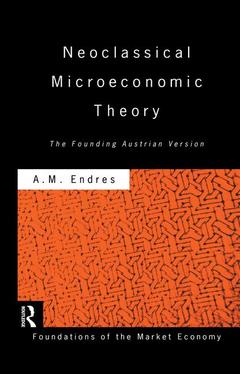Neoclassical Microeconomic Theory The Founding Austrian Vision Routledge Foundations of the Market Economy Series
Auteur : Endres Anthony

Carl Menger, Friedrich Wieser and Eugen Bohm-Bawerk are acknowledged as pioneers in the development of neoclassical economics, as well as being recognized as the founders of the Austrian School of Economics. Neoclassical Microeconomic Theory examines their contribution and compares it with the other branches of neoclassical economics that emerged between the 1870's and 1930's.
The author begins by exploring the initial stimulus provided by Carl Menger's work, and then demonstrates how the views of Menger, Weiser and Bohm-Bawerk complement one another and the tensions exhibited between them: the scope and method of economics; theories of choice; price theory; competition; entrepreneurship; and capital formation and distribution.
Date de parution : 06-2015
13.8x21.6 cm
Thème de Neoclassical Microeconomic Theory :
Mots-clés :
Neoclassical Microeconomic Theory; mengers; Single Seller; principle; Menger’s Principles; marginal; Menger’s Theory; utility; Founding Austrians; work; Wieser’s Work; austrian; Modern Austrian Economics; price; Menger’s Work; formation; Austrian Microeconomics; modern; Wieser’s Theory; economics; Price Formation; Menger’s Economizer; Higher Order Goods; Neoclassical Movement; Neoclassical Microeconomics; Horse Auction; Lawrence White; Capital Combinations; Production Interval; Book III; Produced Price Variance; Marshallian Partial Equilibrium Analysis; Net Return; Marginal Utility Theory; Knowledge Acquisition



